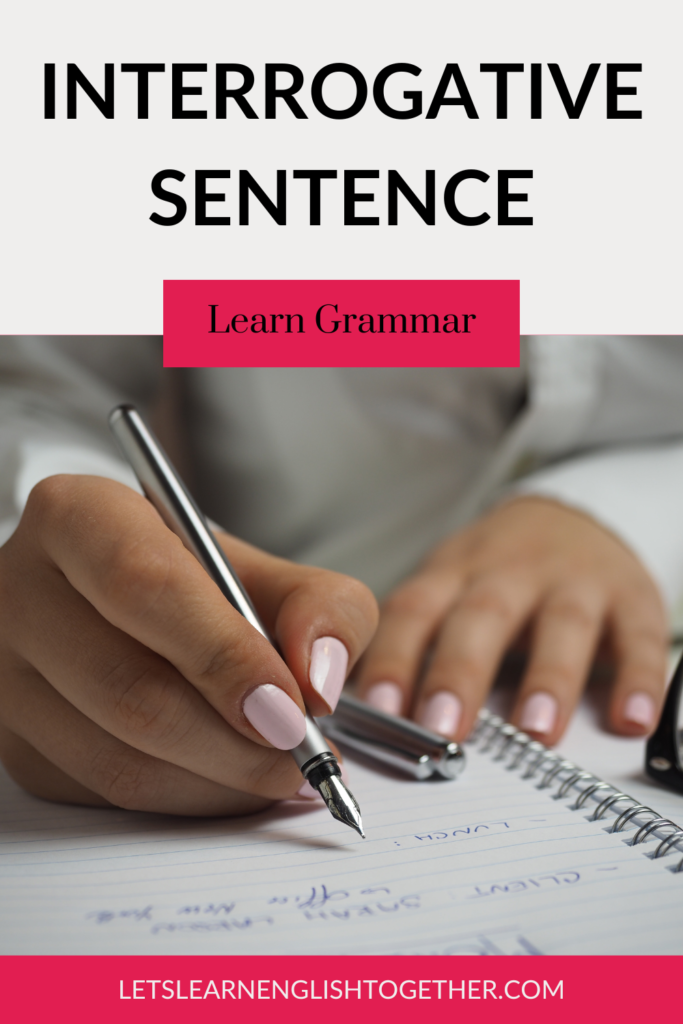Interrogative Sentence: A Comprehensive Guide
This post may contain affiliate links. I may receive a commission for purchases made through these links at no additional cost to you.
Have you ever had trouble asking clear questions? This guide will help you understand interrogative sentences.

Understanding the Interrogative Sentence
What is an Interrogative Sentence?
Interrogative sentences are used to get answers. They end with a question mark. Interrogative sentences let us learn new things, clear up confusing ideas, and talk with others.
Definition and Purpose
Interrogative sentences let us learn more, clear up confusion, and have meaningful conversations.
They are useful for communicating well.
What Is the Difference Between A Question and an Interrogative?
A question is when you ask something to get an answer. It can be any way of asking.
An interrogative is a special kind of sentence that asks a direct question. It has a certain word order and ends with a question mark (?).
All interrogatives are questions. But not all questions are interrogatives.
Examples:
- “What time is it?” – This is an interrogative. It is a direct question. The words are in question order and it ends with ?
- “Tell me the time.” – This is a question, but not an interrogative. The words are not in question order.
- “I wonder what time it is.” – This is not a question or an interrogative. It is just a statement.
So interrogatives are questions. But they are questions with a special sentence structure. The word “question” means any way of asking for information.
Types of Interrogative Sentences with Example Sentences
The 4 types of interrogative sentences are: Yes/No Questions, Or Questions, Open-Ended Questions, and Tag Questions.
Yes/No Questions:
These questions can be answered with just “yes” or “no”.
Examples:
- Are you going outside?
- Have you ever visited Paris?
- Is it raining outside?
Or Questions:
These questions give two or more options to choose from.
Examples:
- Would you like tea or coffee?
- Should we take the bus or the train?
- Did you prefer the red dress or the blue one?
Open-ended Questions:
These questions need longer, descriptive answers. Examples:
- Where did you do last Tuesday?
- How did you learn to do this?
- Why do you enjoy reading fiction books?
Tag Questions:
These questions get added to statements seeking agreement. Examples:
- You packed your lunch for school yesterday, right?
- The science project is due next Friday, isn’t it?
- We should leave early, shouldn’t we?
How to Form Interrogative Sentences
Sentence Structure:
Interrogative sentences typically follow this structure:
Subject + Helping Verb + Main Verb + Rest of the Sentence + ?
Example:
- Do you enjoy playing basketball?
Punctuation Rules:
Interrogative sentences end with a question mark (?). Examples:
- How did the main character change?
- Could you please repeat that?
Inversion of Subject and Verb:
In some interrogative sentences, the subject and verb are inverted (swapped). “You are going to the park” becomes “Are you going to the park?”
Examples:
- Are you insane?
- Did she finish her assignment?
Examples of Interrogative Sentences:
- Did you finish your homework? (Yes/No question)
- Would you like juice or water? (Choice question)
- What is the plot of this movie? (Detail question)
- You’re going to church, right? (Tag question)
Common Mistakes to Avoid
- Forgetting the question mark
- Having words in the wrong order
- Using a statement instead of a question
Fun Exercises to Practice Writing Interrogative Sentences:
- Take turns asking questions with a friend about different topics.
- Read something and make questions about what you read.
- Play “20 Questions” to practice yes/no and open questions.
Tips for Using Interrogative Sentences Effectively:
- Be clear and brief when asking questions.
- Vary the types of questions to keep conversations interesting.
- Listen carefully to answers and ask more questions if needed.
- Use a friendly tone and body language when asking.
- Avoid leading questions that seem to want just one answer.
Short Quiz:
- Which of the following is NOT an interrogative sentence?
a) Why did events unfold that way?
b) I went to the beach last summer.
c) Did you enjoy the movie?
d) What time should we meet?
2. Identify the type of interrogative sentence:
“For recess, will you play tag or jump rope?
a) Yes/No Question
b) Or Question
c) Open-ended Question
d) Tag Question
3. Correct the mistake in the following interrogative sentence:
“You have been to France, haven’t you?”
a) No mistake
b) You have been to France, have you not?
c) Have you been to France, haven’t you?
d) Have you been to France?
4. Rewrite the following statement as an interrogative sentence:
“I am going to the park.”
a) Am I going to the park?
b) I am going to the park?
c) Going to the park, am I?
d) Are you going to the park?
5. Which punctuation mark is used to end an interrogative sentence?
a) Period (.)
c) Question mark (?)
d) Comma (,)
Answers: 1. b, 2. b, 3. c, 4. a, 5. c
10 Examples to Practice Interrogative Sentences:
- What caused the conflict between the cities?
- What could be done to improve the experiment?
- The solution seemed reasonable, didn’t it?
- Are you hungry?
- When did the turning point in the story occur?
- Will you pack a sandwich or salad for lunch?
- Who was affected the most by the situation?
- Did the author have a message?
- Were the two sides similar?
- Should we read or do an art project during free time today?
Mastering how to ask good questions helps communication. It lets you get information, understand ideas better, and talk to others. Remember – asking the right questions is key to learning. Practice will make you a pro at getting answers through interrogative sentences.
FAQs:
Q: What is an example of a present interrogative sentence?
A: A present interrogative sentence is a question about something happening right now. Here is an example:
“Are you eating your lunch?”
This is a question asking if the person is eating their lunch at the present time, right when you are asking the question.



